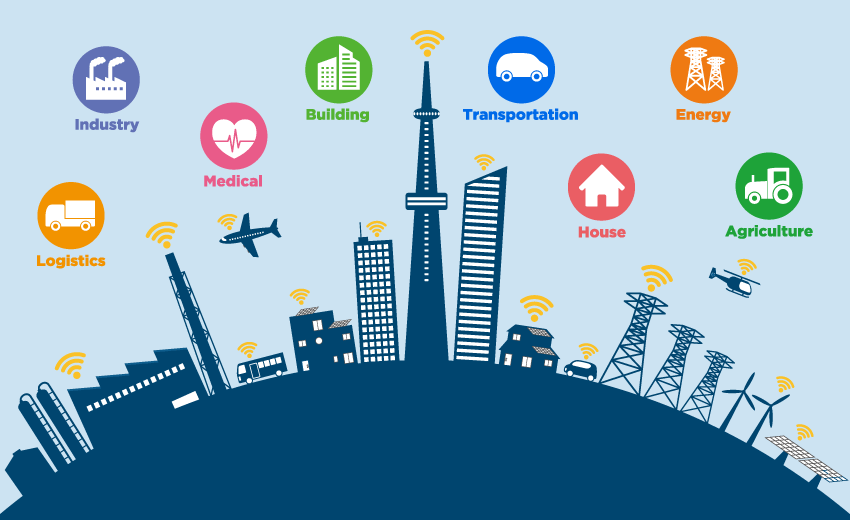Introduction
The Internet of Things (IoT) is redefining industries worldwide, and Saudi Arabia is no exception. As the Kingdom strives to diversify its economy beyond oil through the ambitious Vision 2030 plan, IoT is emerging as a crucial enabler of industrial transformation. From smart manufacturing to enhanced logistics and energy management, IoT is playing a pivotal role in modernizing the industrial sector in Saudi Arabia.
Saudi Arabia’s Industrial Transformation with IoT
IoT in Manufacturing
The manufacturing sector in Saudi Arabia is experiencing a revolution, driven by IoT technology. IoT enables real-time monitoring and control of manufacturing processes, leading to increased efficiency, reduced downtime, and improved product quality. By integrating IoT devices, manufacturers can gather and analyze vast amounts of data, optimizing production lines, and reducing waste.
For instance, predictive maintenance, powered by IoT sensors, allows manufacturers to anticipate equipment failures before they occur, minimizing disruptions and extending the life of machinery. This capability is particularly valuable in industries such as petrochemicals and steel, which are central to Saudi Arabia’s industrial base.
Smart Logistics and Supply Chain Management
Logistics and supply chain management are critical components of Saudi Arabia’s industrial sector, and IoT is transforming these areas by providing greater visibility and control. IoT-enabled tracking devices and sensors offer real-time insights into the location, condition, and status of goods as they move through the supply chain. This transparency allows businesses to optimize routes, reduce fuel consumption, and enhance delivery times.
Moreover, IoT in logistics helps mitigate risks by monitoring environmental conditions such as temperature and humidity, which is vital for industries like pharmaceuticals and food processing. By ensuring that products are transported under optimal conditions, IoT contributes to reducing losses and maintaining product integrity.
Energy Management and Sustainability
Saudi Arabia’s energy sector, traditionally dominated by oil and gas, is undergoing a transformation as the country seeks to embrace renewable energy sources. IoT plays a crucial role in this transition by enabling smarter energy management across industrial operations. IoT devices can monitor energy usage in real-time, identify inefficiencies, and suggest improvements, leading to significant cost savings and reduced carbon footprints.
In the context of Vision 2030, which emphasizes sustainability, IoT is helping industries in Saudi Arabia reduce their environmental impact. For example, IoT solutions are being used to optimize water usage in agriculture and to monitor emissions in industrial plants, aligning with the Kingdom’s goals of environmental stewardship.
Challenges and opportunities of the IoT
Challenges in IoT Adoption
While the potential of IoT in Saudi Arabia’s industrial sector is immense, there are challenges to widespread adoption. Issues such as data security, the need for robust digital infrastructure, and the high initial costs of IoT implementation can be barriers for some companies. Additionally, the skills gap in IoT technology and data analytics presents a challenge, as industries require trained professionals to manage and interpret the vast amounts of data generated by IoT devices.
Opportunities for Growth
Despite these challenges, the opportunities presented by IoT are too significant to ignore. The Saudi government’s investment in digital infrastructure, coupled with incentives for companies adopting new technologies, creates a favorable environment for IoT growth. As more industries recognize the value of IoT in enhancing efficiency and competitiveness, adoption rates are expected to rise.
Furthermore, the development of smart cities in Saudi Arabia, such as NEOM, presents additional opportunities for IoT integration across various sectors, from transportation to energy management. These projects not only showcase the potential of IoT but also serve as a testing ground for innovative solutions that can be scaled across the Kingdom.
Conclusion
The Internet of Things is set to play a transformative role in Saudi Arabia’s industrial sector, driving efficiency, innovation, and sustainability. As the Kingdom continues its journey towards economic diversification and digital transformation, IoT will be a key enabler, helping industries optimize operations, reduce costs, and align with the goals of Vision 2030. Despite the challenges, the opportunities for growth and innovation through IoT are immense, making it a critical component of Saudi Arabia’s industrial future.
Know more about our services here.



